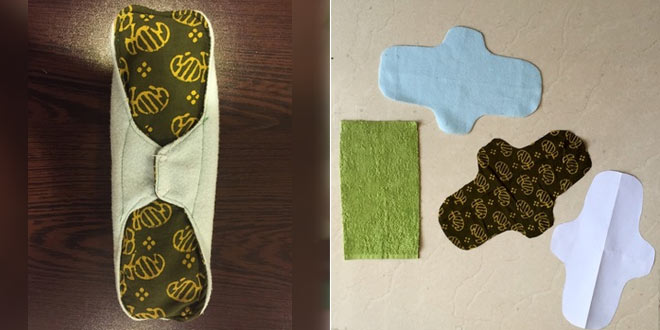New Delhi: This Menstrual Hygiene Day is as much about proper sanitary practices as it is about scientifically dealing with the waste generated. While using sanitary pads is an important aspect of menstrual hygiene, what needs to be understood is that the conventional, mass-produced menstrual products that are for one-time use are made of 90 per cent plastic which makes it a non-biodegradable substance. Experts believe that one traditional sanitary napkin takes approximately 500-1000 years to fully degrade itself. As a result, every time you throw the sanitary waste into the dustbin it ends up going into one of India’s already overfull landfills, rural lands, water bodies or into the urban sewerage systems.
Also Read: Mission Menstrual Hygiene: Jharkhand’s Garima Fauj Is Fighting Myths About Menstruation
The Threat of Menstrual Waste
According to the Menstrual Hygiene Alliance of India (MHAI), every year, India has to take care of about 12.3 billion sanitary napkins, the majority of which are not biodegradable or compostable. WaterAid, an international non-governmental organisation, focused on water, sanitation and hygiene, states that 45 per cent of consumers in India use the routine waste disposable method and opt for dustbins, 23 per cent throw the waste in open spaces like drains, rivers, wells, lakes and roadside and 15 per cent dispose of by burning.
Also Read: Menstrual Hygiene in India: Ditch The Plastic And Go For Eco-Friendly Sanitary Products, Say Experts
How To Tackle The Problem of Menstrual Waste
Here are alternatives to traditional sanitary pads that are affordable, hygienic and eco-friendly!
Anandi Pad – India’s first Compostable and Low-Cost Sanitary Pad
Anandi, India’s first Government of India Lab certified 100 per cent compostable, low-cost sanitary pad that has reached around one million girls and women in India and has uplifted around 600 women across the country by giving them employment opportunities. Available at Rs. 40 (pack of 8) which is 40% lower than the lowest market competitor right now, the pad is 100 per cent biodegradable, thereby ensuring minimal damage to the environment. It is made using locally sourced agriwastes and can be composted within 90-180 days.
One can order Anandi pads through the contacts available on their official site.
Saathi Pad – Made Using Banana Fiber That Can Decomposes Naturally In 6 Months

Kristin Kagetsu, moved from New York to settle in Ahmadabad – reason, she wanted to help women of India make an eco-friendly safe decision for good menstrual hygiene
Image Courtesy: cartierwomensinitiative.com
Kristin Kagetsu, a New Yorker by birth, moved to India back in 2015 because she wanted to tackle menstrual hygiene problem in India. By the end of the year, Kristin Kagetsu came up with a sustainable solution, by the name of Saathi Pads in Gujarat, which were made using locally sourced banana fibre. The unique feature about these pads was the fact that it can decompose naturally in three months if disposed of in the soil and if it ends up in city’s landfills then it could degrade by about six months.
For urban woman, cost of one Saathi pad is Rs. 20, while for the rural woman it is Rs. 5. The pads are available on their website. Moreover, the organisation has also taken an initiative to provide one million sanitary pads to rural women in Jharkhand for free through donations.
<<Read More About Saathi Pads>>
HeyDay – Sanitary Pads Made From Bamboo And Corn
HeyDay pads are end-to-end biodegradable and organic sanitary napkins that are made from bamboo and corn fibre. Launched in 2017 by Deepanjali Dalmia, who quit her job in New York to work for the cause of developing eco-friendly sanitary pads.
Priced competitively with the traditional pads, a pack of seven ultra-thin Heyday sanitary pads is available for Rs. 85, while a pack of 14 pads cost Rs. 165. Maxi fluff Heyday sanitary pads are available at a cost price of Rs. 79 (7 pads) and Rs.155 (14 pads).
Apart from the sanitary pads, the packaging is also biodegradable and can decompose itself within six months. The products are available online on their official site and other e-commerce sites. Moreover, it is also available in some 24×7 stores in Delhi, Gurgaon (Gurugram), Noida and Mumbai.
<<Read More About HeyDay Pads>>
EcoFemme Cloth Pad
Starting from Rs. 86, EcoFemme pads use cotton and are reusable as these pads are washable. Currently, these pads are available at their official online site and many other e-commerce sites for the purchase.
Do It Yourself: Eco-Friendly Sanitary Pad
The first step is to draw a template of a pad on cardboard or white paper. Once done, use it to cut a piece of cloth in the same shape. Then grab a towel, make a strip from the towel and put it in the middle. Then, simply stitch the towel layer onto the front of the cotton piece.
The last step is to prepare the back layer of the pad, you can either get a velour fabric (knitted cloth) and cover the back of the pad or use the same piece of cloth. Last but not least, stitch the back and front together and your homemade cotton pad is ready.
Also Read: Do It Yourself: This Teenager Girl Will Teach You How To Make Your Own Eco-friendly Sanitary Pads
NDTV – Dettol Banega Swachh India campaign lends support to the Government of India’s Swachh Bharat Mission (SBM). Helmed by Campaign Ambassador Amitabh Bachchan, the campaign aims to spread awareness about hygiene and sanitation, the importance of building toilets and making India open defecation free (ODF) by October 2019, a target set by Prime Minister Narendra Modi, when he launched Swachh Bharat Abhiyan in 2014. Over the years, the campaign has widened its scope to cover issues like air pollution, waste management, plastic ban, manual scavenging and menstrual hygiene. The campaign has also focused extensively on marine pollution, clean Ganga Project and rejuvenation of Yamuna, two of India’s major river bodies.



























